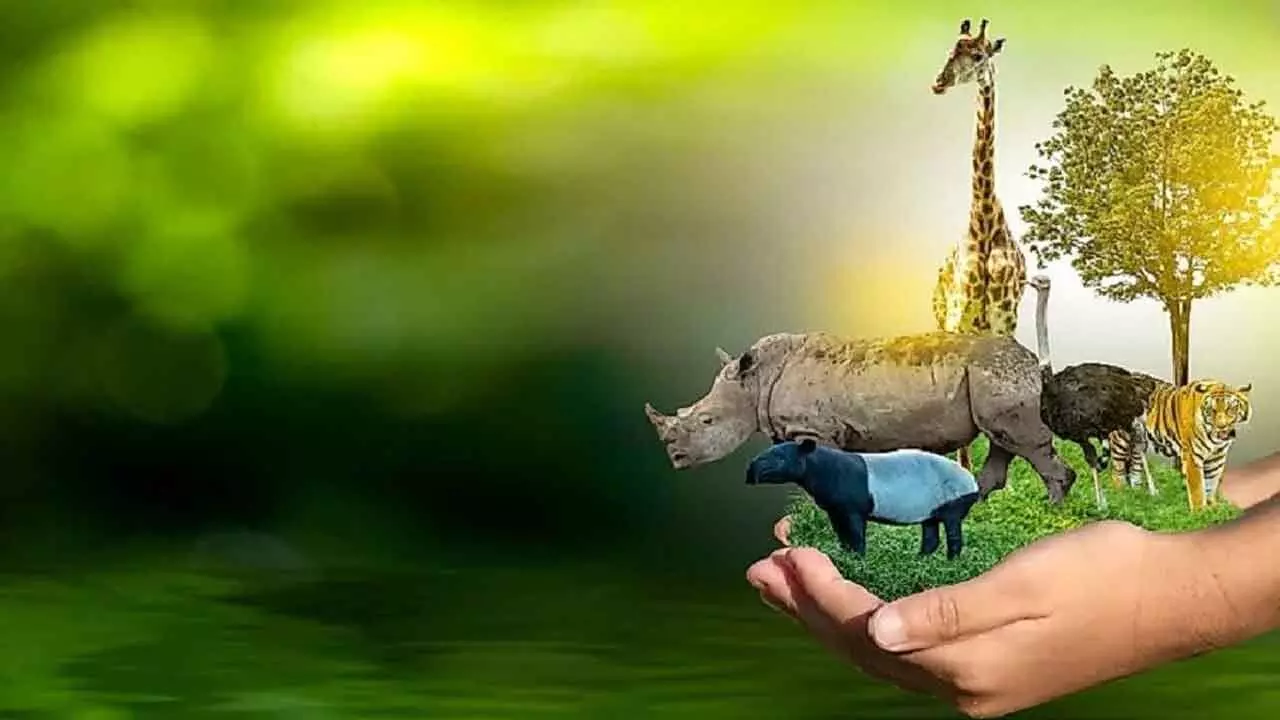Go the whole hog, protect wildlife

Reverence for nature is ancient and almost universal. Early people sensed the presence of deities and spirits in the wilderness, and many legends and histories reach back to that period when the world of nature was at the heart of the world of humanity, and the two could not be separated. This ancient reverence led to special status for sacred mountains, springs, rivers and forests. Modern religions still emphasise the unity of the creation, of which humanity is but one part
Worldwide concern is being expressed about the alarming decline in biodiversity. An increasing number of ecosystems on Earth, containing endangered species, are disappearing. Studies indicate that more than 99% of all species that ever lived on earth, amounting to about 5 billion, have died out. If the phenomenon continues, the very foundations of the traditions of humanity, the economies of countries, livelihoods of people, food security, and health may be seriously eroded, threatening the very existence of life.
Loss of habitats, over-exploitation of wildlife for commercial purposes, and the introduction of harmful non-native species, pollution and spread of diseases are, among others, the primary causes for the high rate of extinction of several species of animals and birds.
Action for conservation began quite some time ago. While hunting preserves, established by rulers or powerful magnates, were ancient, nature reserves, from which hunting was excluded, were rarer. The oldest nature reserve in Europe, which is also a UNESCO World Heritage site, is the Belovezhskaya Pushchai National Park in Belarus. Germany, France and Finland have also the distinction of being home to some of the oldest National Parks in Europe.
Enforcement of conservation laws, as important, if not more, than merely having statutes in place, goes back to King Canute of England during whose reign, (it is believed by one school of historians), in the 11th century, a forest law was enacted that made unauthorised hunting punishable by death. Around the same time, William the Conqueror, created several protected areas, with the purpose of preserving game and forests, among which was what is now known as the New Forest National Park. That was followed in the 16th century by the prohibition of hunting in certain areas, in the Swiss Canton of Glarus, around the same time, the Wood of the Hague was set aside, by the Prince of Holland.
Much later, the Walton Park in England was converted into a bird sanctuary by its owner. At about that time, the Archdeacon Charles Thorp, an environmentalist well ahead of his times, arranged purchase of some of the Farne Island off the north-east coast of England and employed a Warden to protect threatened seabird species.
Later on, in 1887, a conservation law was passed by the British Indian government in 1887, known as the Wild Birds Protection Act, which sought to prohibit possession and sale of specified wild birds during the breeding season. The modern National Parks movement is unquestionably an American creation. In 1864 United States Congress granted the Yosemite Valley to the State of California, to be held inalienably - for public use, resort and recreation. Congress also established the world’s first National Park –Yellowstone in 1872. The trickle soon became a flood, spreading from North America to Europe, and to the many parts of the world colonized by Europeans. While Australia established its first Royal National Park in 1879, Banff, in Canada, followed in 1885, and Tongariro in New Zealand, in 1894 (although the mountain at its heart had been sacred to the Maori people for generations before). Europe was led by Sweden, which established six parks in 1909.
The desire to protect wildlife, and the need to preserve natural resources, has resulted in several international agreements being entered into, following in-depth discussions at various fora. Prominent conservation agreements include the Convention on International Trade in Endangered Species of Wild Fauna and Flora, and passed as part of an international agreement to prevent the global trade of endangered wildlife, and the 1992 Convention on Biological Diversity, which was agreed on at the UN Conference on Environment and Development (often called the Rio Earth Summit) as an international accord to protect the Earth’s biological resources and diversity. There are also numerous non-governmental organizations dedicated to conservation such as the Nature Conservancy, World Wildlife Fund, the Wild Animal Health Fund and Conservation International.
In 1980, the World Conservation Strategy was developed by the IUCN with help from the United Nations Environmental Programme, the World Wildlife Fund, the Food and Agricultural Organization, and United Nations Educational Scientific and Cultural Organization. Its purpose was to promote the conservation of living resources important to humans.
Reverence for nature is ancient and almost universal. Early people sensed the presence of deities and spirits in the wilderness, and many legends and histories reach back to that period when the world of nature was at the heart of the world of humanity, and the two could not be separated. This ancient reverence led to special status for sacred mountains, springs, rivers and forests. Modern religions still emphasise the unity of the creation, of which humanity is but one part.
It has also, for long, been recognised that animals, too, have their rights. Many faiths, organisations and individuals have recognised the imperative of animal rights. Jainism, for instance, stresses on the need to prohibit cutting of trees or the use of fabrics produced through the harming of other living beings. The earliest known animal cruelty legislation was enacted by the Parliament of Ireland as long ago as in 1635, prohibiting the tearing of wool off living sheep. Among the most well-known animal rights activist is Jane Goodall, the founder of the Jane Goodall Institute.
The Society for the Prevention of Cruelty to Animals (SPCA), founded in England in 1824, has, as its objective, the protection of all animals from cruelty, neglect and ill treatment. Closer to home, Maneka Gandhi, the well-known political leader, founded People for Animals in 1992, which has emerged as the largest animal welfare organisation of the country. I recall how, while I was working as a Chief Secretary to the Government of Andhra Pradesh, she, as a Union Minister, called me up to express concern over the indiscriminate killing of stray dogs in Hyderabad.
Public officials, known as Game Wardens, are entrusted with the responsibility of enforcing conservation laws. Their primary duties are enforcement of conservation laws and protection of wildlife, and other natural resources, from poachers and other criminals. These champions of wildlife are law enforcement professionals with special training in wildlife and conservation law. The office of a Game Keeper, which originated in England and some other European countries in the 17th century AD, gained importance with the spread of the Conservation Movement.
Here is a real life story to end this piece on a lighter note.
My father had a very interesting relationship with my uncle (his brother-in-law), which was as authentic as it was laced with leg-pulling and innocent satire. One Sunday afternoon, as our family was preparing to go to the zoological park in Hyderabad, one of my uncles dropped in. Father immediately invited him to accompany us. When the uncle said that he had already been to the zoo, and was not keen on joining us, father promptly said, “It is not that I want you to see the animals, I want them to have the unique opportunity of seeing a creature like you!”
(The writer is formerly Chief Secretary, Government of Andhra Pradesh)








